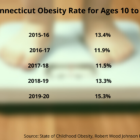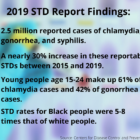Lockdowns, Remote Learning Contribute To Surge In Childhood Obesity
|
Poor nutrition, stress and a loss of physical activity when schools closed during the COVID-19 pandemic appear to be worsening the problem of childhood obesity nationally and in Connecticut. Nationally, obesity among youth ages 2 to 19 increased from 19.3% in 2019 to 22.4% in 2020, according to the Robert Wood Johnson Foundation. The same age group saw the rate of increase in their body mass index (BMI) double during the pandemic, the U.S. Centers for Disease Control and Prevention reports. The heaviest youths experienced the highest gains. In Connecticut, the obesity rate among ages 10 to 17 rose from 13.3% in 2018-19 to 15.3% in 2019-2020, according to the Johnson Foundation report.









